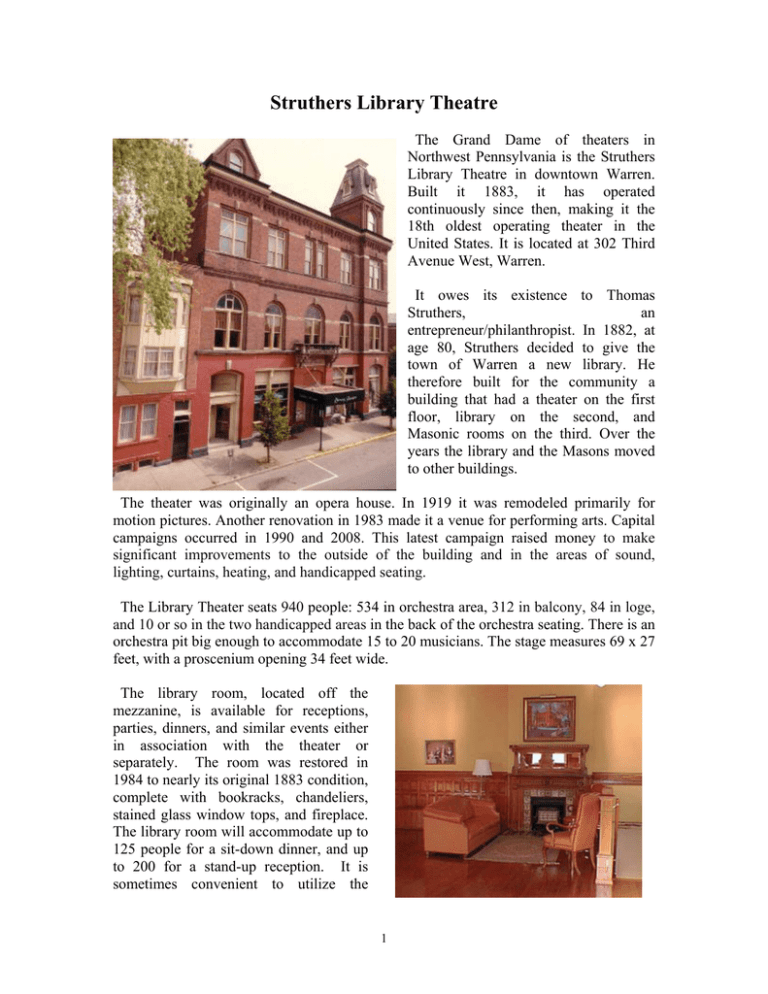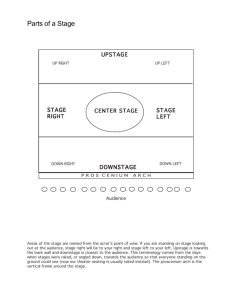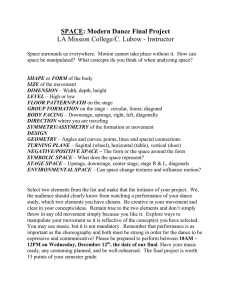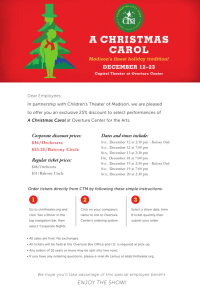Library Theatre Tech Specs - Struthers Library Theatre
advertisement

Struthers Library Theatre The Grand Dame of theaters in Northwest Pennsylvania is the Struthers Library Theatre in downtown Warren. Built it 1883, it has operated continuously since then, making it the 18th oldest operating theater in the United States. It is located at 302 Third Avenue West, Warren. It owes its existence to Thomas Struthers, an entrepreneur/philanthropist. In 1882, at age 80, Struthers decided to give the town of Warren a new library. He therefore built for the community a building that had a theater on the first floor, library on the second, and Masonic rooms on the third. Over the years the library and the Masons moved to other buildings. The theater was originally an opera house. In 1919 it was remodeled primarily for motion pictures. Another renovation in 1983 made it a venue for performing arts. Capital campaigns occurred in 1990 and 2008. This latest campaign raised money to make significant improvements to the outside of the building and in the areas of sound, lighting, curtains, heating, and handicapped seating. The Library Theater seats 940 people: 534 in orchestra area, 312 in balcony, 84 in loge, and 10 or so in the two handicapped areas in the back of the orchestra seating. There is an orchestra pit big enough to accommodate 15 to 20 musicians. The stage measures 69 x 27 feet, with a proscenium opening 34 feet wide. The library room, located off the mezzanine, is available for receptions, parties, dinners, and similar events either in association with the theater or separately. The room was restored in 1984 to nearly its original 1883 condition, complete with bookracks, chandeliers, stained glass window tops, and fireplace. The library room will accommodate up to 125 people for a sit-down dinner, and up to 200 for a stand-up reception. It is sometimes convenient to utilize the 1 adjacent mezzanine in conjunction with the library room to accommodate slightly larger groups. There are folding chairs and round folding tables available in the library room to seat about 100 people. • Location The Struthers Library Theatre is located in the downtown business district of Warren at 302 Third Avenue West, the corner of Liberty Street. Third Avenue is two blocks off Route 6 (Pennsylvania Avenue) and one block south of Route 62 (Fourth Avenue) where these highways pass through town. Most downtown stores are within two or three blocks of the theater, and there are several restaurants with modestly priced menus within a block of the theater which include The Plaza, NY Pizza and Deli, Wellness Café, Mardi Gras, Snuffy’s and the Liberty Street Cafe. McDonald’s is a little over three blocks and Wendy’s, Tim Horton’s, and Pizza Hut about six blocks away on Route 6 east. Perkins (open 24 hours a day) is a mile west on Route 6. Holiday Inn and Super 8 Motel are across from Perkins. In North Warren about 6 miles north on Route 62 are Applebee’s, Bob Evans, and Burger King. Lowe’s and a Hampton Inn are located in this plaza area, too. Parking for theater patrons is available on the streets and in several parking lots within a block or two of the theater. Parking is free in the lots on evenings and weekends. • Auditorium and Public Facilities The auditorium seats 940 with 534 in the orchestra, 312 in the balcony, 84 in the loge, and 10 in the handicapped areas at the back of the orchestra area. All seats are numbered and may be sold on a reserved seat or open seating basis. Public restrooms are located on the mezzanine level in the theater. There is a second ladies restroom and, for those unable to climb stairs, an additional restroom located on the main floor at the rear of the auditorium • Heating and Air Conditioning All occupied rooms in the building are heated, including the auditorium, lobby, mezzanine, restrooms, stage, dressing room, control booth, orchestra green room, and library room, but none of the third floor rooms are heated. Air conditioning is available, but must be arranged in advance. There is an extra charge for use of the air conditioning. The library room and third floor rooms are not air-conditioned. • Ticket Sales and Publicity There is a box office (double window) in the lobby for the sale of tickets at performance time. However the lobby is not open to the public at other times, nor is the box office staffed by theatre personnel at any time, so other arrangements must be made for pre-performance sales, if that is required. Many tickets are sold through the theatre offices during regular business hours. Under certain circumstances and only with prior approval of the theater management some tickets may be sold online via the theater’s website. 2 There are two display cases at the front entrance to the theatre where posters and other advertising may be displayed. • Dressing Rooms There are 7 dressing rooms in the backstage area, directly behind the stage. One is a 10 x 12 foot room on the first floor, usually used by the lead performer. There is one on the second level (8 x 12 feet), 4 on the third level and one 12 x 16 foot room on the fourth floor. Each of these dressing rooms contains a sink with cold water, a clothes rack, dressing table and mirror, several chairs, and electrical outlets. In addition to the rooms above, there is a green room in the basement that is sometimes used as a dressing room by larger companies. It has a makeup table with mirrors, clothes rack, chairs, and electrical outlets, but no sink. There is a paging system to all dressing rooms, the basement room, and the hall just outside the upstage door. There is a live send from the front of stage as well as a paging mike at stage right or from the light booth. • Backstage Restrooms There are 4 restrooms backstage. One is in the onstage dressing room and another one opening off the backstage hall. There are two more on the second floor. They have cold water. There are no showers in the building. • Orchestra Pit and Preparation Room The orchestra pit is in front of the stage and 36 inches below the auditorium floor level. It runs nearly the full width of the auditorium, but is narrow (6 ½ x 45 feet) and has a 15 inch raised section running 3 1/3 feet from the stage right end of the pit. There are 24 electrical outlets on three circuits in the pit for stand lights and electrically powered or amplified instruments.The pit will accommodate 20 musicians comfortably, 24 to 30 in a pinch. There is a curtained railing around the pit on the auditorium side, with an opening at the center so that the conductor may enter from the auditorium side if desired. There is also access from the green room in the basement. There is a set of stairs available to run from stage center over the pit to the auditorium. The pit is equipped with a Clear-Com station so that the conductor may communicate with the stage manager. The green room is a 14 x 19 foot enclosed room in the basement with direct access to the pit. There are 24 Manhasset type music stands available and 16 stand lights. Folding chairs are available as needed. There is an upright piano and a Conn Electric Organ in the orchestra pit. The other piano available, onstage (upstage left in a piano garage), is a Steinway 9-foot Grand. Both pianos are maintained in good condition with frequent tuning. • Costume Pressing Area There is a 14 x 14 foot area in the basement equipped for costume use. There is available an iron, ironing board, steamer, and several clothes racks. There is a washer and dryer across the room. 3 • Stage Area The stage is 69 x 27 feet, with a proscenium opening 34 feet wide. The last upstage batten (usually with a full stage black) is three feet from the upstage wall, providing a crossover, and the main curtain hangs about a foot behind the proscenium. Thus, the maximum playing depth of the stage is 23 feet. The legs (black velour) that define stage width provide a playing width of about 30 feet. There is an additional 4 feet of playing area in front of the main curtain. The floor at the extreme front 24 inches of this space is a grillwork covering over the footlight trough. One can walk on it, but ladies in high-heeled shoes beware. New main curtain, legs, traveler, traveler track, a full width black curtain, and borders were installed in 2011. Access to the house area from the stage is usually through the wing space on either side of the stage to stairs and through a door to the house. If requested, a center set of stairs may be put in over the orchestra pit for direct access from the stage to the house and vice versa. • Stage Floor The stage floor is a 1983-built Douglas fir edge-grained, tongue and grove surface painted gray. The floor is not waxed. The surface flooring is underlain by plywood over wooden floor joists. • Wing Space and Scenery Storage Space for storage of scenery and set pieces is limited. Wing space at stage right with the legs in their normal full-stage position is 10 x 27 feet. The rigging lock rail and hand lines are stage right and room must be left for their operation. The door from the dressing room area enters at upstage right and people waiting to go on stage tend to accumulate here. There is a stage manager table in the down stage area of this space. Available at the table location is a Clear-Com station, dimmable light, work light switches, white and blue running lights, and the paging system. Wing space at stage left is 14 x 27 feet and unobstructed except for the piano garage in the upstage left corner (6 x 9 feet) and storage of the cinema speaker tower. The top of the piano garage is available for storage (props, cases, etc). Downstage right is the caged ladder to the upper fly rail (a hemp system) that controls the borders Directly behind the stage in the dressing room area, there is a small scenery storage room. This 7 x 15 foot room also houses all of the theater electrical service panels and the dimmer banks, so only about half of it is available. Access to this room is through a 5 foot wide by 16 foot high scenery doorway at upstage center. This doorway blocks the crossover space behind the last upstage drop and makes this exit impractical to use in the run of show unless another drop is in and the upstage drop is flown. • Loading and Unloading A 5 foot wide by 16 foot high scenery door to the outside is upstage left next to the piano garage. This door provides primary access to the stage for loading and 4 unloading of scenery and equipment from outside. This doorway is at street level (there is a 2 inch lip into the doorway). Outside this door is a parking space large enough to accommodate a small truck or van (about 30 feet maximum length). This space will not accommodate a bus or large truck. There is a theatre owned parking lot beyond this parking space, and parking is available on the street alongside the theater. Arrangements must be made in advance to use these spaces. Either will permit a truck or bus to be parked within 25 feet or so of the backstage loading door. There is no shore power. • Rigging Height from the stage floor to grid is approximately 50 feet, with 48 feet being the maximum height to which scenery can be flown. Primary rigging is T-bar counterweight-rigging sets manufactured by Tiffin Studios, with 4 cable lines per set. Each set has a maximum rated capacity of 1000 pounds. The locking rail and control lines are located stage right at floor level. The hemp running lines were replaced in 1999 with synthetic running lines. There are 28 line sets total. Battens are 44 feet long, schedule 80, and 1½-inch diameter pipe. Only experienced fly operators are allowed to handle this system. In addition to the counterweight lines, there are 3 hemp sets operated from a fly gallery platform 30 feet above the stage floor, stage left. Each of these sets is rated at 300 pounds maximum load. These lines are used for the three borders. The travel on these hemp lines is limited and only experienced fly persons are allowed to operate this system. • Stage Curtains In 2011 the main curtain, the legs, traveler, (and the traveler track,) upstage full width black curtain, and the borders were installed new. The basic stage curtains, used for framing the stage, are black velour. There are 4 sets of legs and borders (when you count the open traveler as first leg and the raised main curtain as first border) plus 2 full width drops, the downstage traveler, and the main curtain. The deep rust colored main curtain is guillotine-style with a center overlap opening. The normal trim height is 16 feet. The normal hanging plot is as follows. 1 2 3 4 5 H1 6 7 8 -3” -1’ 0’-0” 0’-9” 2’-0” 3’-0” 3’-9” 4’-6” 5’-0” 7’-0” 7’-9” 8’-3” Foot Lights – under steel grate Thrust Plaster Line Main Curtain - Guillotine #1 Electric – 24 Circuits Open #1 Leg – Olio Traveler Black Scope Movie Screen Black Border – Rope Line Stage Left #2 Electric – 12 Circuits #2 Black Legs Open 5 9 10 11 12 H2 13 14 15 16 17 18 19 H3 20 21 22 23 24 25 26 27 28 8’-9” 9’-3” 10’-0” 10’-6” 11’-0” 12’-0” 13’-0” 13’-6” 14’-3” 15’-0” 15’-6” 16’-0” 16’-6” 17’-6” 18’-6” 19’-0” 19’-9” 20’-9” 21’-6” 22’ 3” 23’-0” 24’-0” 27’-0” Open Full Stage Black Historic Drop – Vaudeville Open Black Border – Rope Line Stage Left #3 Electric – 12 Circuits #3 Black Legs Historic Drop – Street Scene Open Red Drop Open Open Black Border – Rope Line Stage Left #4 Electric – Cyc Lights #4 Black Legs Breeze Point Drop (may be removed) Open Open Open Library Room drop (may be removed) White Cyc Full Stage Black Upstage Wall The borders are on a hemp and sand fly system. They can be trimmed but cannot be brought to stage level. The theater management does not want the cyc nor the historic drops moved due to their age and would appreciate plots designed around them. The Scope movie screen cannot be moved. • Stage Lighting There are four on-stage electrics, mounted permanently on counter-weighted line sets 2, 6, 13, and 20. There are 24 circuits and the number one electric and 12 each on the other three. There are two floor pockets and two upstage wall boxes surrounding the playing area. There are also two floor pockets with Edison receptacles, 110 AC. The standard lighting plot is included. The dimmers are Strand Century CD80 dimmers. They are 2 dimmers per module at 2.4K each, with 96 dimmers available. Two modules have one dim and one non-dim circuit. The two non-dim circuits are set to the upstage wall, but they may be moved to any location. They are wired as a dimmer per circuit system with pigtails on the four onstage battens and sockets on the two wall positions and the booth wall. The following lighting installations are available: 16 each 8 x 13 Strand Century 1000 watt ellipsoids separately circuited mounted front of house on pipe stanchions on the walls at each side of the balcony. 8 each ETC Source 4 19° 575 watt ellipsoids on two circuits mounted on the ceiling in front of the booth wall. 5 each Strand Century Iris Cyc Lights 3 x 500 watt mounted on the fourth electric. The following 6 additional instruments are available and some are hung in the standard plot as described below. __ 6 each Strand Century 1000 watt 6 inch fresnels. 12 each Altman 500 watt 6 inch fresnels. 10 each 65Q 6 inch Altman 750 watt fresnels. 8 each 75Q 8 inch Altman 1000 watt fresnels. 22 each 360Q 6 x 9 Altman 750 watt ellipsoids. 24 each 360Q 6 x 12 Altman 750 watt ellipsoids. 24 each 360Q 6 x 16 Altman 750 watt ellipsoids. 4 each 1KL6 50° Altman 1000 watt ellipsoids. 3 each 1KL6 40° Altman 1000 watt ellipsoids. 6 each 1KL6 30° Altman 1000 watt ellipsoids. 4 each 1KL6 20° Altman 1000 watt ellipsoids. 15 each 1KL6 20-40° zoom Altman 1000 watt ellipsoids. 31 each 1000 watt wide pars. Two each Lycian short throw follow spots located in a booth at the rear of the balcony. The lighting control board is an ETC Element located in the same booth. Dimmers are soft patchable and cues may be set. The standard lighting plot has a warm (R33) and cool (R60) wash from the booth wall and the side balcony walls covering the front of stage. Four 9 x 12 ellipsoids are also hung on the balcony walls as a center special. The warm and cool washes are continued from the #1 electric with 3 each 6 x 9 ellipsoids per color with frost pointed upstage. The stage is down lit warm (R02) with fresnels. 6 each 1000 watt 6” on #1, 8 each 1000 watt 8” on #2 and 8 each 750 watt on #3. The cyc is lit red (R124), amber (R20). and blue (R80) and a par back wash in red (R26), amber (R21). and blue (R68) is set. Pipe end side light is set on all four electrics. Center specials are set on #1 and additional specials are hung on both #1 and #2. Our light booth is located at the back of the balcony. The two follow spots, the usual placement of the light board, the Clear-Com main console, a small secondary 7 sound mixer, and a large film projector with platters are located here. In an adjoining room reside the sound amps and patch bay. • House Light Control All auditorium house lights are on a keypad system. They are located in the light booth, backstage stage right wall and lobby area. There are settings for Movie, Full House, Half House, and Performance. • Sound System Our sound system was upgraded in 2010. The 48 channel Yamaha M7CL-48 digital mixer is mounted in a balcony booth with the amp rack and patch bay located in a balcony top-rear room. There is a hard-wired snake going to front of stage, stage left and right, and upstage left and right. It terminates at a patch bay in the sound booth and an additional patch bay in the amplifier room itself to accommodate needed patching. There are three main speaker arrays that cover the auditorium area. The first is a Wideline 10 rigged over the proscenium to cover the balcony area. The remaining two L’Acoustics ARCs are on either side of the proscenium and fill the orchestra seating on the main floor of the theater auditorium in addition to an under balcony fill system installed in 2004 consisting of 16 Electro-Voice EVID 8.2c. One QSC PLX 1104 amplifier powers the proscenium-mounted balcony speaker array. Two QSC PL340 amplifiers power the left and right main auditorium speaker arrays. A Crown DC-300A2 amplifier powers the two monitor sends. Monitor mix one is downstage on both sides and mix two is upstage left and right. There are four EAW SM129zi monitor wedge speakers available for onstage use. There is a wireless system in the theatre. One eight channel Shure U Series and one 8 channel Shure ULX with distribution antennae systems. Both systems have distribution amps and cover the whole theatre. All 16 transmitters are equipped lapel mics. There is one wireless handheld mic. There are 5 Shure SM58 mics, 3 Shure SM57 mics, 1 Crown PZM mic, 4 Audio Technica boundary mics, and 3 choral mics. A variety of cables and stands are available. The lighting booth has an independent sound feed of the house system with its own volume control. The front of house console area is located in the center of the balcony just behind the loge section. It has a full view of the stage and a full aural view of the main clusters. Playback is available through a Sony CD/Minidisc combination unit. The “secondary” front of house area is comprised of a Mackie DFX6 mixer mounted on the wall next to the lighting console to be operated by the board operator. This mixer has complete accessibility to all snake lines and wireless microphones. This mixer can feed the main rig, the front fills, and monitors. The DFX6 is limited to four channels of operation. There is a Fender Passport portable Public Address system that can be used. • Intercommunication System The theatre is equipped with a Clear-Com 2-channel intercom system. Though most stations can be switched to either A or B channels, we usually keep A channel 8 feeding the box-office, and the lighting booth main console. The B channel feeds the lighting booth (2), the sound booth, the pit, stage manager’s table, fly rail, stage left, upper stage left pin rail, and back of house area. There are a total of 8 headsets for use at these stations. • Assisted Listening Devices We have 15 Sennheiser infrared monaural headset receivers for the use of our hearing-impaired audience members. The emitter panel is located at an organ loft on house left. • Emergency Telephone Numbers Emergency telephone numbers are posted on the bulletin board near the telephone backstage and in the box-office. They are: Ambulance 723-3550 Hospital 723-3300 Police 723-2700 Fire 723-4200 or 723-7100 Emergencies 911 • Rules and Regulations One rule we enforce strictly is the prohibition of smoking in the building. This is an almost 130 year-old structure with wooden floors, grid, and roof beams and would be very susceptible to fire. 9


